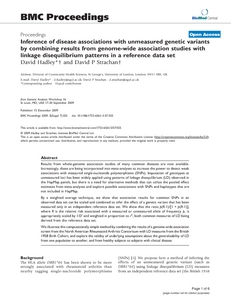Hadley, D; Strachan, DP
(2009)
Inference of disease associations with unmeasured genetic variants by combining results from genome-wide association studies with linkage disequilibrium patterns in a reference data set.
BMC Proceedings, 3 (Suppl 7) (S55).
ISSN 1753-6561
https://doi.org/10.1186/1753-6561-3-S7-S55
SGUL Authors: Strachan, David Peter Hadley, David
![[img]](https://openaccess.sgul.ac.uk/92/1.hassmallThumbnailVersion/1753-6561-3-S7-S55.pdf)  Preview |
|
["document_typename_application/pdf; charset=binary" not defined]
Published Version
Download (664kB)
| Preview
|
Abstract
Results from whole-genome association studies of many common diseases are now available. Increasingly, these are being incorporated into meta-analyses to increase the power to detect weak associations with measured single-nucleotide polymorphisms (SNPs). Imputation of genotypes at unmeasured loci has been widely applied using patterns of linkage disequilibrium (LD) observed in the HapMap panels, but there is a need for alternative methods that can utilize the pooled effect estimates from meta-analyses and explore possible associations with SNPs and haplotypes that are not included in HapMap.By a weighted average technique, we show that association results for common SNPs in an observed data set can be scaled and combined to infer the effect of a genetic variant that has been measured only in an independent reference data set. We show that the ratio p(R-1)/[1 + p(R-1)], where R is the relative risk associated with a measured or unmeasured allele of frequency p, is appropriately scaled by 1/D' and weighted in proportion to r2, both common measures of LD being derived from the reference data set.We illustrate this computationally simple method by combining the results of a genome-wide association screen from the North American Rheumatoid Arthritis Consortium with LD measures from the British 1958 Birth Cohort, and explore the validity of underlying assumptions about the generalizability of LD from one population to another, and from healthy subjects to subjects with clinical disease.
Statistics
Item downloaded times since 30 Apr 2012.
Actions (login required)
 |
Edit Item |




